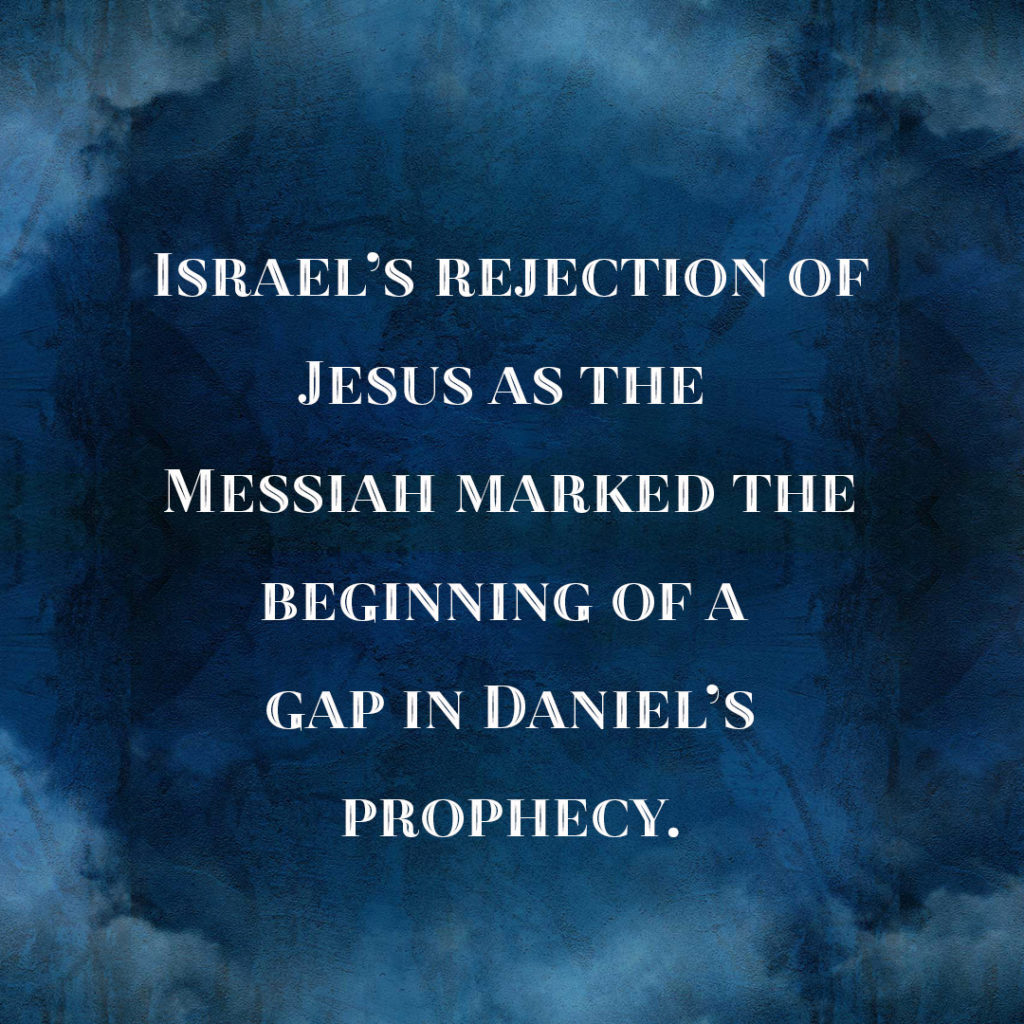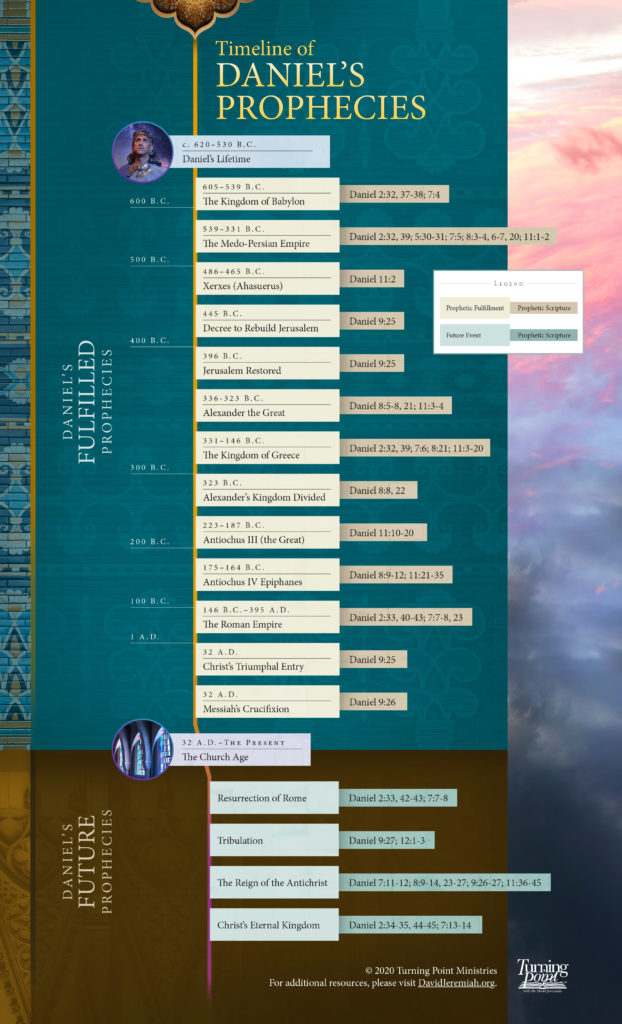When Robert Louis Stevenson introduced the world to Treasure Island in 1883, he kindled something deep in the imagination of readers young and old. Thoughts of ruthless pirates, sea-swept islands, and buried treasure stretched readers’ minds to envision unknown places—and clues that might be hiding right under their noses. Newer adventure stories like Raiders of the Lost Ark and National Treasure continue to thrill us with notions of uncovering hidden secrets. Wouldn’t it be something to dig up buried treasure in the backyard or to discover mysterious clues in the attic?
That’s exactly what happened to Daniel. He had been held hostage in Babylon for decades when something in the prophecies of Jeremiah caught his attention: his people’s captivity would be limited to seventy years—and that amount of time was nearly over! (Jeremiah 25:11-12; 29:10) We don’t know how long Daniel had been in possession of Jeremiah’s prophecies or how many times he may have read them, but suddenly the words leapt off the pages and he discovered the treasured knowledge that God was about to set his people free.
Equipped with a new understanding of God’s Word and His will, Daniel dropped to his knees in prayer. On behalf of his entire nation, he confessed their hard-hearted rebellion and wickedness. He acknowledged God’s righteous judgment and begged for mercy. Before he could finish his prayer, the angel Gabriel arrived with a reply known as the Seventy-Weeks prophecy. It maps out a series of events that began in Daniel’s lifetime and will continue until the Second Coming of Christ.
By studying the Seventy-Weeks prophecy, we can discover clues about the End Times.

Understanding the Time Involved With Daniel’s “Seventy Weeks”
Daniel 9:24
The first step to decoding the Seventy Weeks is to understand the meaning of week. In Hebrew, the original word means “a period of seven” and can apply to days or years. A more literal translation of Daniel 9:24 would be “Seventy sevens are determined.” History has proven that Daniel was referring to years rather than days, but we can also use context to determine his meaning. In verse 2, he references “seventy years,” so the “seventy sevens” in verse 24 are seventy groups of seven years.
Before we study the other details of Daniel’s prophecy, we also need to understand that his years consisted of 360 days, not 365. This is consistent with many ancient calendars, including other biblical records. A close examination of Genesis reveals that the earliest known month in Bible history was thirty days in length (Genesis 7:11, 24; 8:3-4), and multiplying thirty days by twelve monthly periods produces a year of 360 days. In Revelation 11:3 and 12:6, the apostle John counts a three-and-a-half-year period as 1,260 days, indicating a 360-day year.
The First Seven Weeks: Rebuilding Jerusalem
Daniel 9:25
According to verse 25, the prophecy of the Seventy Weeks would begin with a decree to rebuild the city of Jerusalem. History has recorded four ancient decrees to restore the temple, but only one of them fulfills the requirement to rebuild the city as well—a proclamation by Artaxerxes that scholars have dated to March 14, 445 B.C. (Nehemiah 2:1). Following this decree, the Jewish people endured “troublesome times” as they rebuilt their homeland despite significant opposition from other groups in Judea, completing their project in 396 B.C. (Ezra 9–10).
The Next 62 Weeks: Awaiting the Messiah
After the rebuilding of Jerusalem, Daniel’s prophecy anticipated “Messiah the Prince”—a Hebrew phrase associated with kingly authority. In Jesus’ New Testament existence on this earth, the one time He appeared as a Prince and a Ruler was at His Triumphal Entry into Jerusalem. When He rode into the city on a donkey, His followers recognized the day’s significance and received Him with praise: “Blessed is the King who comes in the name of the Lord!” (Zechariah 9:9; Psalm 118:26; Luke 19:38) Starting from March 14, 445 B.C., we can calculate the date of Christ’s Triumphal Entry to be April 6, 32 A.D.1

The Suspension of the Prophecy: Rejecting the Messiah
Daniel 9:26
Five days after Jesus rode into Jerusalem as the promised Prince, the Jews called for His execution, fulfilling Isaiah’s prophecy of the Suffering Servant and Daniel’s prophecy that the Messiah would be “cut off” (Isaiah 53:1-12; Daniel 9:26; Luke 23). They knew about Isaiah’s Suffering Servant, but they didn’t realize the Servant and the Messiah were one in the same. In fact, the Jews saw themselves as the servant because they had been subjugated so often by other nations. They expected the Messiah to appear as the majestic “Ancient of Days” described in Daniel 7:9-10. When He appeared instead as One with “no form or comeliness,” they “did not receive Him” (Isaiah 53:1; John 1:11).
Israel’s rejection of Jesus as the Messiah marked the beginning of a gap in Daniel’s prophecy. Scholars refer to this indefinite period of time as “unreckoned time,” and it is an era we are still living in today. It is unreckoned because God only reckons time with the Jews when He is dealing with them as a nation. That has not occurred since the Triumphal Entry and will not occur again until the Tribulation.

The Final Week: Dealing With the Antichrist
Daniel 9:27
As the era of unreckoned time draws to a close, the Church will be raptured away without notice, and the final seven-year period of Daniel’s prophecy will begin. This final week will start with the ratification of a treaty between “the prince who is to come” and the nation of Israel. The prince, or world leader, will agree to provide military protection and religious freedom for Israel. In the first years of the treaty, he will even help the Jews rebuild the temple and reestablish the sacrificial system.
After three-and-a-half years, this seemingly generous ruler will break the treaty, put an end to the sacrificial system, and begin a reign of terror. Other passages of Scripture reveal his true nature through a variety of names, including “the man of sin” (2 Thessalonians 2:3), “the beast” (25 times in Revelation), and “the Antichrist” (1 John 2:18). When the Antichrist violates the terms of the treaty, it will mark the beginning of the Great Tribulation (Matthew 24:21; Revelation 4–19).
We need to keep in mind that the entire prophecy relates to the nation of Israel and the city of Jerusalem. God dispatched Gabriel to deliver this message in response to Daniel’s prayer and confession on behalf of his people. The final week of Daniel’s prophecy also relates directly to the Jews, and it will culminate in the completion of six events.

The Terms of the Prophecy: Removing Sin and Restoring Righteousness
Daniel 9:24
Before Daniel’s Seventy Weeks are finished, six important transactions must take place between God and the nation of Israel. Three of the six concern the removal of sin, and the other three concern the restoration of righteousness.
To finish the transgression.
For all who have accepted Jesus as the Messiah, sin was conquered at the cross. But for the rest of Israel, the consummation of His redeeming work will not occur until the end of the Tribulation. Zechariah, who prophesied in Jerusalem after the Babylonian captivity, foresaw a change in Israel’s attitude toward the Lord during the Last Days that will result in widespread repentance and reconciliation (Zechariah 12:10; 13:1).
To make an end of sin.
Sin will continue to be part of the human experience throughout the Last Days and the Tribulation. But when Jesus returns to set up His earthly kingdom, sin will be destroyed—never to do its evil work again. In the words of the prophet Ezekiel, “They shall not defile themselves anymore with their idols, nor with their detestable things, nor with any of their transgressions; but I will deliver them from all their dwelling places in which they have sinned, and will cleanse them. Then they shall be My people, and I will be their God” (Ezekiel 37:23).
To make reconciliation for iniquity.
This is a statement of atonement. Thousands of years of sinful disobedience on the part of Israel will be settled with God before the prophecy is complete. While Christ isn’t mentioned in this verse, He is the One making the atonement. At the end of the Seventy Weeks, Israel will finally recognize the atoning effect of Jesus as Messiah (Daniel 9:26).
To bring in everlasting righteousness.
With sin eliminated, the nation of Israel will lay claim to Christ’s righteousness at the Second Coming. Everlasting righteousness will rule and reign on the earth.
To seal up vision and prophecy.
When Christ returns and establishes His kingdom, every prophecy concerning Him will be fulfilled. There will be no further need for visions and prophets because there will be no more sin. In the words of Jeremiah,
Jeremiah 31:34
To anoint the Most Holy.
In Scripture, the phrase “the Most Holy” describes the sacred place in the temple that is also referred to as the Holy of Holies. Christ’s kingdom will be established when the holy place in the Millennial temple is completed and dedicated for service (Ezekiel 41–46). For Daniel, who spend most of his life longing for reunification with his people and the reestablishment of the temple, this condition carried tremendous promise.
Daniel’s Seventy-Weeks prophecy is a lot like a treasure map. It is only four verses in length, yet it contains prophetic clues to thousands of years of human history. Each word is rich with meaning. We won’t discover all its treasures in one reading. But if we—like Daniel—apply ourselves to studying this passage as an integral part of God’s Word, the Lord will help us to understand it. “If any of you lacks wisdom, let him ask of God, who gives to all liberally and without reproach, and it will be given to him” (James 1:5).
Sources:
1Sir Robert Anderson, The Coming Prince (London: Hodder and Stoughton, 1909), 121-123.
Continue your study of biblical prophecy with these other popular articles by David Jeremiah:
Seven Churches of Revelation Bible Study
Becoming a Cashless Society—A Financial Sign of the End Times
What Is the Tribulation?
Why Would Anyone Accept the Mark of the Beast?
What is the Great White Throne Judgment in Revelation?
The False Prophet in the Book of Revelation
11 Answers to Questions About the End Times
What Is the Rapture?
What Is the Millennium? 7 Answers to 7 Questions
4 Signs of the End Times
the 144,000 in the Book of Revelation
The Revelation Prophecy Timeline
See all prophecy articles here >

